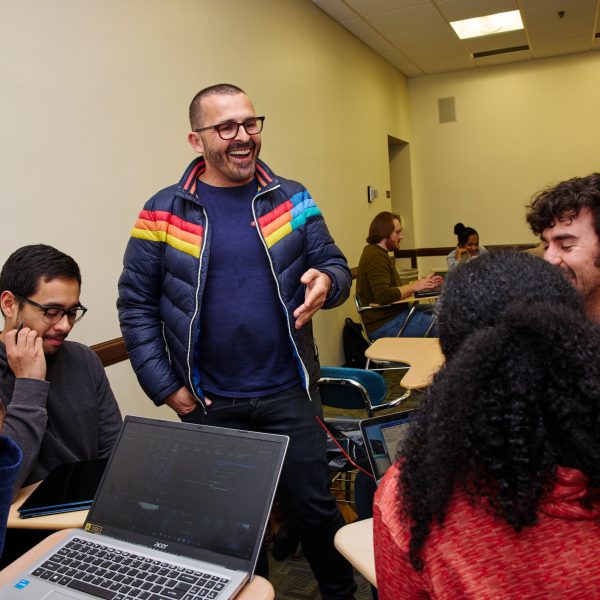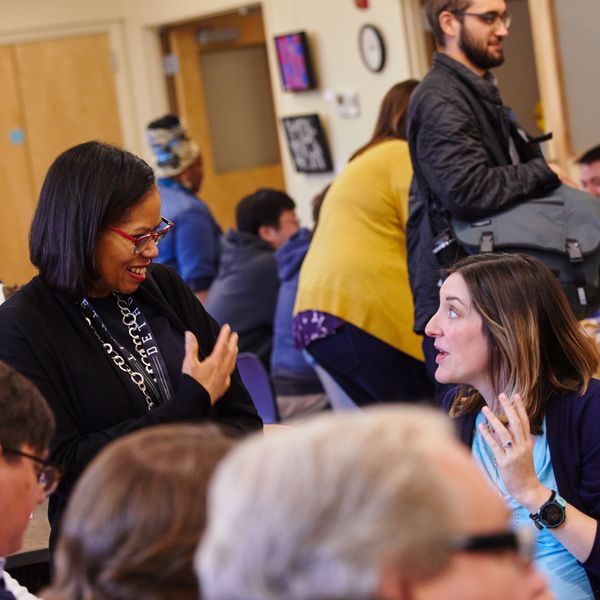Master of Divinity (MDiv)
Prophetic and practical religious leaders are essential to the ongoing work of transforming both the church and the world while addressing the unique challenges of the 21st century. Recognizing the need for diverse approaches to training today’s religious leaders, the School of Theology offers a Master of Divinity (MDiv) program with three flexible tracks that allow students to customize coursework with their unique vocational calling in mind. The MDiv program is designed to be completed in three years (6 semesters) of full-time study and offers opportunities to fulfill the ordination requirements for many faith traditions. MDiv students may also complete one of the School of Theology’s certificate programs as part of their studies.
All MDiv tracks share a common set of “core” courses (30 units) in Sacred Texts & Interpretations, History of Traditions & Institutions, Theology & Meaning Making, Ethics & Lived Values, Spirituality, Religious Leadership Practices, Formation, and Contextual Education. About 20% of the MDiv curriculum consists of track courses (15 units). Students then have 27 free elective units with which to further customize their degree.
The School of Theology Bulletin is the official source for all policies and requirements of the Master of Divinity Degree. By the end of the first year of study, students must declare a particular vocational track, with its own unique plan of study. The MDiv tracks are as follows:
Ecclesial Ministry Track
The Ecclesial Ministry Track provides students the most defined pathway to fulfill the requirements for ordained or endorsed ministry. It supports those preparing for ecclesial ministry, grounding them deeply in their own tradition while equipping them broadly for ministerial practice in a religious community in alignment with their ecclesial standards.
Plan of Study
MDiv Core (30 units)
- First Year Formation in the first fall semester(3 units)
- Sacred Texts and Interpretation (6 units)
- Hebrew Bible
- New Testament
- History of Traditions and Institutions (3 units)
- Theology and Meaning-Making (3 units)
- Ethics and Lived Values (3 units)
- Spirituality (3 units)
- Religious Leadership Practices (3 units)
- Year-long Contextual Education internship in a congregational site (6 units), usually in the second year
Ecclesial Ministry Track (15 units)
- Additional History of Traditions and Institutions or Theology & Meaning-Making course (3 units)
- Additional 4 courses out of the following categories (12 units)
- Denominational History course
- Denominational Polity course
- Worship course
- Preaching course
- Spiritual Care course
- Evangelism course
- Mission course
- Another History of Traditions & Institutions course
- Another Theology & Meaning-Making course
Free Electives (27 Units)
Chaplaincy Track
The Chaplaincy Track provides students a curriculum organized around the emerging competencies necessary for providing spiritual care within or beyond traditional religious spaces. Designed for students preparing to be chaplains, spiritual directors, spiritual entrepreneurs, or other religious practitioners, this track gives students an opportunity to develop skills in culturally relevant care within the rapidly changing landscape of religious and spiritual demographics.
Plan of Study
MDiv Core (30 units)
- First Year Formation in the first fall semester(3 units)
- Sacred Texts and Interpretation (6 units)
- Hebrew Bible
- New Testament
- History of Traditions and Institutions (3 units)
- Theology and Meaning-Making (3 units)
- Ethics and Lived Values (3 units)
- Spirituality (3 units)
- Religious Leadership Practices (3 units)
- Year-long Contextual Education internship in a congregational site (6 units), usually in the second year
Chaplaincy Track (15 units)
- STHTY 860 Introduction to Chaplaincy (3 units)
- STHTY 704 Spiritual Care (3 units)
- An advanced spiritual care and counseling course that seeks to grow skills in providing spiritual care and counseling in chaplaincy contexts, and focused on trauma, death and dying, grief and loss, pastoral theology, psychology of religion or specific to population you hope to serve (3 units)
- A course that equips you to respond effectively to religious difference and/or conflict in practice. This course should prepare you to work in religiously pluralistic settings, with emphasis on helping build competencies for navigating multiple forms of difference and responding to conflict (3 units)
- Course that equips students to provide ritual and/or organizational leadership (3 units)
Free Electives (27 Units)
Open Track
The Open Track provides students the possibility of curricular customization and specialization in an academic field of study, vocational direction, or certificate plan of study. Students work with their faculty advisor to design a five course plan of study that furthers the student’s vocational discernment and preparation. Students are strongly encouraged – though not required – to pursue a certificate program. This option is especially appropriate for those who are pursuing dual degrees, vocations in global and community engagement, community organizing, faith based non-profits/NGO’s, interfaith leadership, theology and the arts, and much more.
Plan of Study
MDiv Core (30 units)
- First Year Formation in the first fall semester(3 units)
- Sacred Texts and Interpretation (6 units)
- Hebrew Bible
- New Testament
- History of Traditions and Institutions (3 units)
- Theology and Meaning-Making (3 units)
- Ethics and Lived Values (3 units)
- Spirituality (3 units)
- Religious Leadership Practices (3 units)
- Year-long Contextual Education internship in a congregational site (6 units), usually in the second year
Open Track (15 units)
- Students work with their faculty advisor to design a five course plan of study that furthers the student’s vocational discernment and preparation. Students are strongly encouraged (but not required) to pursue a certificate program.
Free Electives (27 Units)
Dual Degree: MDiv/MSW
The dual degree Master of Divinity/Master of Social Work (MSW) track is designed for students who are enrolled, or who plan to seek admission, in the dual degree program the School of Theology shares with the School of Social Work, the Master of Divinity/Master of Social Work degree. This track ensures that courses counting for both degrees are tracked properly and guides the student through both programs efficiently. At present, almost one-third of MDiv coursework is shared with Social Work, thereby reducing the time it takes to complete both degrees had they been taken separately.
Dual Degree: MDiv/MAT
The School of Theology and the Wheelock College of Education & Human Development (Wheelock) offer two dual degree programs: the Master of Divinity/Master of Arts in Teaching (MDiv/MAT) and the Master of Theological Studies/Master of Arts in Teaching (MTS/MAT). Opportunities abound for religious educators in both secular and religious contexts, not only for the teaching of a particular religion, but for teaching any number of other subjects in religious or faith-based institutions. The combination of expertise in theology and religion with the various academic fields for which the MAT prepares persons uniquely position graduates from the dual degree as interdisciplinary leaders and educators with broad intellectual horizons and pedagogical depth.
The Master of Arts in Teaching degree program at Wheelock is designed for college graduates who want to continue their studies in an academic field, and at the same time secure initial licensure to teach at the secondary level. Currently, Wheelock offers MAT degrees in English Education, Mathematics Education, Modern Foreign Language Education, Science Education, and Social Studies Education. While the MAT program requires students to possess an undergraduate degree, or equivalent amount of coursework, in the intended area of study, the program does not presume students have completed coursework in education. The MAT program leads to licensure as a middle or high school teacher in all states and in the District of Columbia through reciprocal licensure agreements. Individual states may have other requirements.
For students who matriculated before Fall 2024, students can retain the academic track they were admitted into, such as Pastoral Ministry, Global and Community Engagement, Religion and the Academy, Theology and the Arts, Chaplaincy, Organizational Management, or Interfaith Leadership Track.
MDiv Conversion Plans of Study
All students who matriculated before Fall 2024 must use a MDiv Conversion Plans of Study, which they can find on the MDiv Program page in the Student Intranet.
MDiv Learning Outcomes
The MDiv curriculum is shaped by the conviction that prophetic, practical, religious leaders, thoroughly grounded in the wisdom of their traditions, are essential to the work of on-going transformation of the church and the world. The degree seeks to educate religious leaders who can interpret complex and evolving local and global contexts and engage those contexts in creative and confident conversation with a full array of theological resources.
The primary learning outcomes of the MDiv include:
- Develop competence in studying, reflecting upon, and contextualizing sacred and historical texts, including the Hebrew and Christian bibles.
- Grow in practices of spiritual formation, relational support, self-care, self-understanding, and humility; while cultivating embodied practices for sustained ministry.
- Grow in the ability to provide holistic, spiritual, relational, and communal care.
- Grow in capacities for engaging across differences (social, cultural, and religious) in ways that foster mutual understanding, learning, and/or collaboration.
- Develop competence in constructive meaning-making and the ability to think critically, creatively, and theologically in conversation with traditions, histories, and lived practices.
- Develop competencies in leading communities through practices of moral and spiritual discernment, ethical witness, and transformative engagement with conflict.
- Develop competencies in leading religious and spiritual practices, guiding rituals, and communicating effectively to address the needs of various publics (for example, public speaking, preaching, the arts, and writing).
- Develop capacities to respond to complex contemporary challenges, through careful analysis of systems, cultures, and institutional structures.
- Develop skills in creating and administering ecclesial and/or non-profit organizations.
MDiv Assessment Information
Master of Divinity students participate in several assessment opportunities throughout their degree program, the most significant of which is the Mid-Degree Assessment in the fourth term. The following outlines the assessment requirements.
FIRST TERM
- Students retain a copy of their application essay for use in the assessment process.
- Students are introduced to the assessment process in the First-Year Formation course.
- When the faculty advisor meets with the student to discuss course advising, they are encouraged to check in with the student about the following three areas: 1) intellectual growth; 2) faith/spiritual tradition; 3) vocational discernment.
SECOND TERM
- When the student meets with the advisor to select courses, they should also check in about contextual education placement, which begins in the third term. But a conversation about ideas for this is good to have with the advisor.
THIRD TERM
- By the end of the tern, students should have collected the appropriate documents in preparation for their mid-degree assessment: personal statement, one paper/project/presentation with one-paragraph rationale, the contextual education evaluation (self-assessment and supervisor), and the student’s completed assessment survey (materials can all be uploaded on the survey).
FOURTH TERM
- The mid-degree assessment takes place this term.
- At the beginning of the term, a formal letter goes out from the Academic Dean’s office, explaining the process for the mid-degree conversation. Several questions are included in that letter to prepare the members for a productive conversation about the student’s development.
- At least two people should be involved in the mid-degree conversation. 1) Faculty advisor; 2) at least one other of the student’s choosing. This could be the contextual education supervisor, a spiritual companioning leader, a minister from home, an undergraduate professor, etc. One of the members may join the conversation via Skype. The faculty advisor will guide the conversation.
- All members of this group are expected to read the portfolio materials in preparation for the meeting. Instructions for the Assessment Team can be found here.
- Following the discussion, the faculty advisor should complete the assessment survey and submit it to the Academic Dean’s office.
MDiv Mid-Degree Assessment Survey
FIFTH TERM
- Regular course selection/advising meeting with the faculty advisor.
FINAL TERM
- Students complete the final assessment survey before April 1 (or November 1, if graduating in January).
- The Academic Dean meets with small groups and they engage in an assessment of the various areas. This conversation is aimed, more directly, at assessing the MDiv program.



